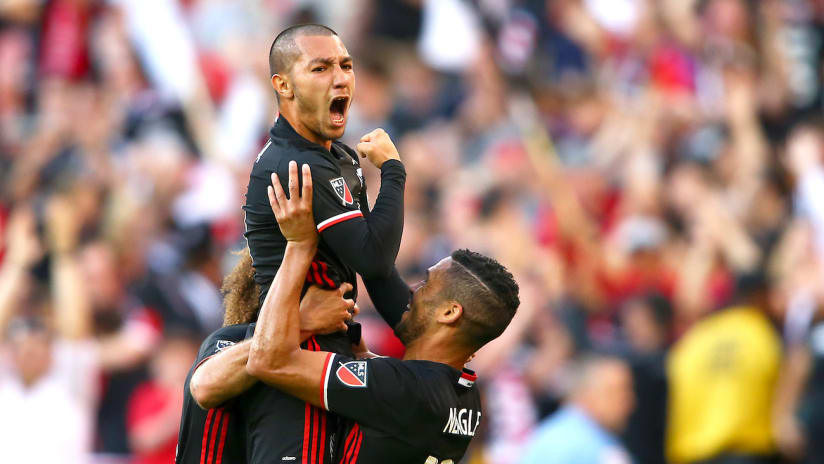It seemed to happen in slow motion. With United already 2-0 up against the New England Revolution on April 23, Luciano Acosta received a cross from Álvaro Saborio on the run. With just one man to beat, the young Argentine playmaker dribbled towards Revs defender Jose Goncalves, drawing him to the left before taking just the slightest hesitation and cutting the ball onto his right foot. Then, having seen New England goalkeeper Bobby Shuttleworth positioned off his line, D.C.’s #11 hit a stunning chip in stride that sailed into the back of the net from 20 yards out.
Not a bad way for a 21-year-old recent signing to score his first MLS goal.
The finish, which was voted AT&T Goal of the Week by fans (and later the Goal of the Month), was the capstone of a fruitful early couple of months in the league for this budding talent. Acosta has appeared in all twelve of United’s matches this season (starting seven), and leads the team with three assists on the season. At just 5-foot-3-inches, the Buenos Aires native is extremely skillful on the ball, and relies on technical prowess and low center of gravity to deftly navigate tight spaces and take defenders on one-v-one. But perhaps his most remarkable quality as a player is his ability to find near-impossible seams with his passing, to open the game up and offer solutions--evident, for example, in his brace of assists to Saborío against Vancouver. A type of player not often seen at United in years past, Acosta’s emergence offers new dimension and flexibility to the D.C. attack.
Despite his youth, Acosta has significant top-level experience under his belt already, and boasts huge potential with his unique skill set. Signed on loan in February from Argentine giants Boca Juniors, the inventive attacking midfielder--who has seen most time with United as a withdrawn forward with freedom to roam--featured in 25 matches for Boca two seasons ago, and made 27 appearances on loan with Estudiantes de La Plata last year. He’s also seen minutes in the Copa Libertadores, South America’s elite club cup competition.
Still, the move to the U.S.--both on and off the field--hasn’t been without its challenges. Speaking of the faster pace of the American game, Acosta explains, “In Argentina, perhaps you had a little more time to think about what you could do. Here you go past one player and then there’s another player after you.” Likewise, the language barrier has been difficult. But he’s learning English, and cites the help of his teammates--particularly Brazilian midfielder Marcelo, who is fluent in both Spanish and English and has acted as his “translator”--in easing the process. “It’s taken time to adapt, but I’m adapting quickly, he says.
Away from the pitch, Acosta is appreciative to have loved ones close by: his girlfriend Carolina and their young son, Constantino, have been able to make the move with him to the United States. “They’re great support, and [to have them here] is a great feeling to me,” he says. He’s also grateful for the possibilities the United States can offer to his young family, citing his wish “to bring them out of a country where perhaps life isn’t so easy,” and to give his son the best opportunities possible. “My son is everything to me,” he explains. “I made the decision to come here to give him a better life.”
In all likelihood, young Constantino will be able to watch his father dazzle on the field for years to come.




